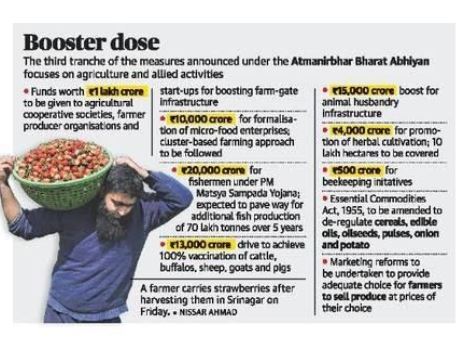UPSC Articles
Third tranche of the economic stimulus package announced
Part of: GS Prelims and GS-III – Agriculture; Economy
In News:
- Agricultural marketing reforms were introduced in the third tranche of the Atmanirbhar Bharat Abhiyan economic stimulus package.
Key takeaways:
- A central law to permit barrier-free inter-State trade of farm commodities shall be framed.
- A legal framework to facilitate contract farming may also be brought in by the Central government.
- Contract farming would provide farmers with assured sale prices and quantities even before the crop is sown and also allow private players to invest in inputs and technology in the agricultural sector.
- ₹1.5 lakh crore shall be invested to build farm-gate infrastructure and support logistics needs for fishworkers, livestock farmers, vegetable growers, beekeepers and related activities.
- The sale of six types of agricultural produce – cereals, edible oils, oilseeds, pulses, onions and potatoes will be deregulated by amending the Essential Commodities Act, 1955.
- Stock limits will not be imposed on these commodities except in case of national calamity or famine or an extraordinary surge in prices. These stock limits would not apply to processors and exporters also.
Important value additions:
Essential Commodities Act, 1955 (ECA)
- The ECA was enacted in 1955.
- The act provides for the control of production, supply, distribution, trade and commerce in any farm good deemed “essential” and “in the interest of the general public”.
- The list of items under the Act includes drugs, fertilisers, pulses and edible oils, and petroleum and petroleum products.
- The Centre under the Act has the power to include new commodities as and when the need arises, and can take them off the list once the situation improves.
- It protects consumers against irrational spikes in prices of essential commodities.

Image source: The Hindu














